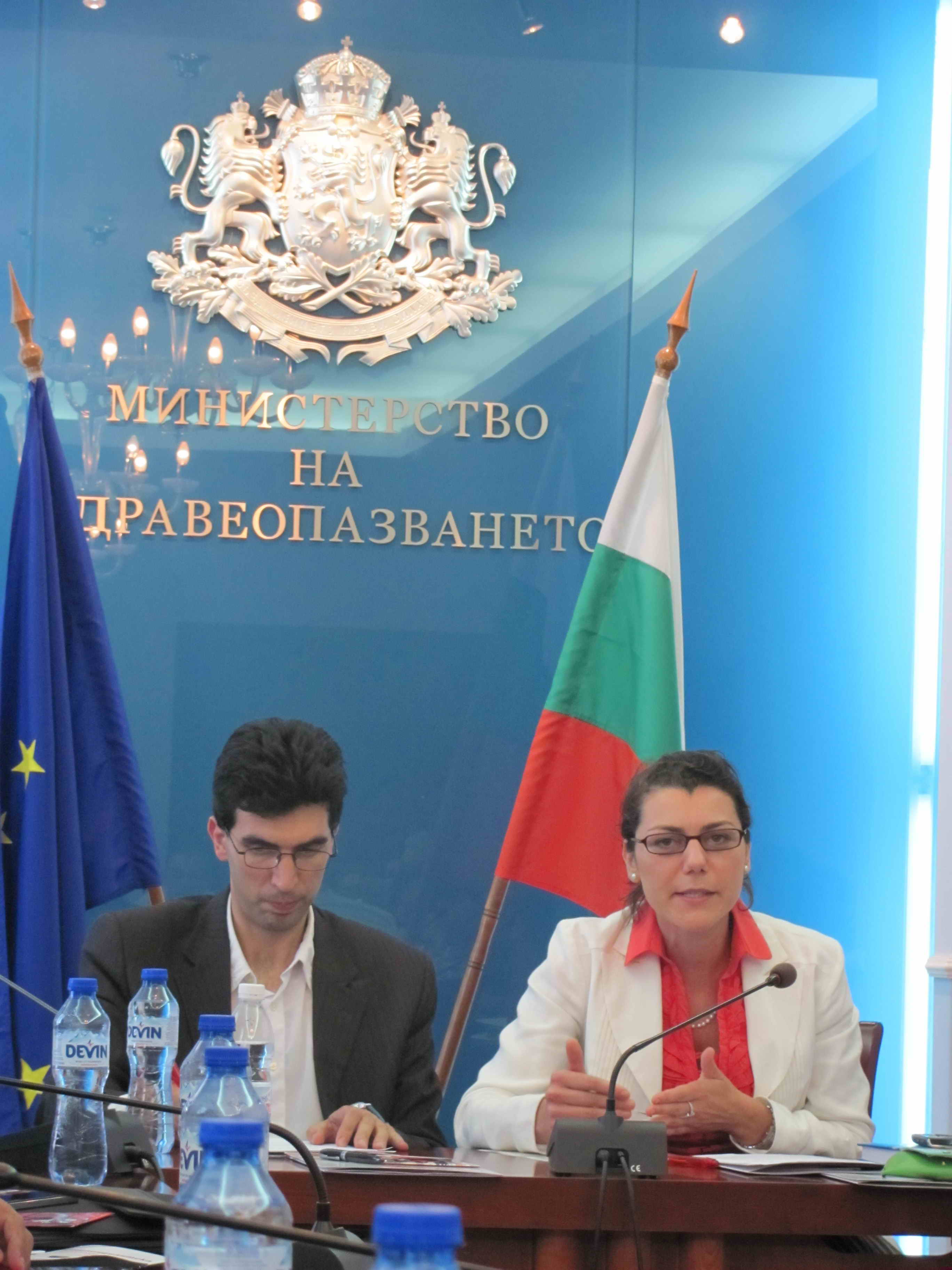12.07.2011Round table “New generation of Roma health specialists: Results and perspectives” took place in Sofia
 On July 8th 2011 at the Ministry of health a Round table “New generation of health specialists of Roma origin. Results and perspectives” took place. It was initiated by Center Amalipe with the support of Roma Health Project of OSI. The purpose of the meeting was to take stock of achievements and to look ahead at concrete mechanisms for reaching sustainability of the successful practice of Roma health scholarship program (RHSP).
On July 8th 2011 at the Ministry of health a Round table “New generation of health specialists of Roma origin. Results and perspectives” took place. It was initiated by Center Amalipe with the support of Roma Health Project of OSI. The purpose of the meeting was to take stock of achievements and to look ahead at concrete mechanisms for reaching sustainability of the successful practice of Roma health scholarship program (RHSP).
Participants in the Round table were the Minister of the EU funds Tomislav Donchev, Deputy minister of health Desislava Dimitrova, Deputy minister of education, youth and science Petya Evtimova, Pravda Ignatova from State Agency for social assistance, Alina Covaci from Open Society Institute – Budapest (OSI), Dimitar Dimitrov – representative of Roma education fund (REF) for Bulgaria, Georgi Krastev – Deputy Chairman of the National Council for cooperation on ethnic and integration issues (NCCEII), representatives of institutions and embassies as well as more than 30 Roma students from medical universities and colleges from around the country. The main partners on the RHSP also participated in the Round table, namely Open Society Institute – Sofia that coordinates the “Scholarship” Component of the Program, Center Amalipe that coordinates “Advocacy” Component of the Program, Association “Diverse and Equal” that coordinates “Mentorship” Component of the Program, Pro Media that coordinates “Public representation” Component of the Program and Ethnic Minorities Health Problems Foundation that coordinates the preparation courses for candidates. Other partners also took part in the Round table such as Dr. Stefan Panayotov from Health of Roma Foundation, Gancho Iliev from Association World without borders, Spaska Mihailova from Association New way and others.
“The Roma integration has no alternative and investments in its process should be made”, said in his opening speech Minister Donchev – Nevertheless, more important is what we invest in – whether we have models that proved its success and are worth to be embraced as a state policy. In the field of healthcare such models are present. For example, the model of the health mediator is such a model. But this is only one element that has to be complemented by others. The Program that supports Roma medical students is another successful model that gives a chance for the Roma community to be represented in the healthcare system at a higher level and this model has to be supported as well!” Minister Donchev underlined also that it is necessary the National strategy for Roma integration to be pragmatically done whereupon it will turn the successful practices – such as the Roma health scholarship program – into state policies.
Deputy Minister Dimitrova underlined that the Ministry of health recognizes four effective models for improving the access of Roma people to healthcare: health mediators, medical and social centers, Roma health scholarship programand the deinstitutionalization. We will work for the expansion and endorsement of these models and for that purpose we will use funding from European funds and other financial mechanisms as well as the state budget, asserted Mrs. Dimitrova.
During the Round table the components of the RHSP were presented also the achievements to this date, the effect of the Program for improvement of the access of Roma people to healthcare as well as the effect on the overall process of educational and social integration of the Roma community. Each component was presented by the organization that coordinates it and by a student. The sincere and natural words of the students combined with well-structured presentations happened to be the best illustration of the success of the Program. Practically they showed that an entire generation of Roma medical graduates with high academic records is forming and this generation will take part in the advocacy efforts for improvement of the access to healthcare of Roma people.
Saturated with pragmatism were the discussions on the possibilities for continuation of the Program after its pilot stage and its transformation of sustainable policy through the mechanisms of OP Human Resources Development (OP HRD) and other financial instruments. “REF and OSI will finance the Program only one more year, said Mr. Deyan Kolev. Together we have to find a solution how to continue it!” The discussion that followed outlined 5 major conclusions:
1. The Program is successful and it will be continued.
2. One of the best possibilities for continuation of the Program is the Norway financial contribution – in the framework of signed agreement is provisioned that 10% of the provided funds are targeted at projects for Roma integration. Practically all components of RHSP can be financed by this mechanism.
3. Bulgarian – Swiss Program is another good possibility: the “Roma” component” of this Program puts an accent on healthcare and education.
4. OP HRD can also finance the Program for Roma medical students. A debate on framework of which priority axis that can be done is necessary and how all component can be funded.
5. The state budget also has to be engaged in the Program financing.








